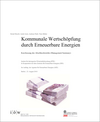
Municipalities and regions: important players in the energy transition

Municipalities play an important role in the transition from fossil fuel-based systems to renewable energy (RE) systems. This is notably shown by trends such as ambitious expansion targets in 100%-renewable-energy municipalities and regions, and remunicipalisation trends in recent years. Besides climate protection, the value added by RE is an increasingly important motive for local stakeholders. Substituting imported fossil fuels and final energy with domestic and renewable energy sources, technologies and services can be economically profitable for municipalities and regions.
However, until recently the value-added effects of RE were subject to few scientific analyses and were difficult to quantify accurately. The IÖW then developed a model for calculating local value-added effects for the most relevant decentralized RE technologies.
The WeBEE Model – a brief outline
In the study “Local value added by RE”, published in 2010, the IÖW compiled a model to calculate the local value-added and employment effects of RE (WeBEE – Wertschöpfung und Beschäftigung durch Erneuerbare Energien) on behalf of the German Renewable Energy Agency (AEE e.V.) This model has been enhanced since then and applied in multiple regional studies, e.g. for the federal states of Brandenburg, Baden-Wurttemberg and Mecklenburg-Western Pomerania. The model calculates business profits, wages and salaries and municipal taxes and also employment effects for 24 value chains covering a wide range of RE technologies.
Contact

Prof. Dr. Bernd Hirschl
Phone: +49–30–884 594-0
bernd.hirschl(at)ioew.de
Team
Dr. Astrid Aretz
Katharina Heinbach
Johannes Rupp
Dr. Steven Salecki
André Schröder
Dr. Julika Weiß


